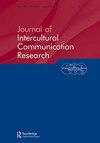A Pragmatics-based Appeal to Saving Face so as to Save Lives: On Intercultural Pragmatic Awareness (or rather: Lack thereof) in a Handbook for US Soldiers Deployed for Iraq
Q1 Social Sciences
Journal of Intercultural Communication Research
Pub Date : 2021-05-04
DOI:10.1080/17475759.2020.1869581
引用次数: 0
Abstract
ABSTRACT The present paper zooms in on levels of pragmatic awareness and the range of stereotypical presuppositions as appearing in one specific text, i.e. the Soldier’s Handbook to Iraq. This text was made available to the 1st infantry division of the US Army when they proceeded to Iraq in 2003. In the present mixed-methods study we demonstrate that the handbook systematically uses what Beukeboom and Burgers (2019) call ‘biased language’ in that the text is cohesively composed of such lexico-semantic choices that point explicitly or implicitly to (mostly negative) stereotypes associated with the categories of ‘Arabs’ or ‘Iraqis’. We pay specific attention to the cross–cultural use of imperatives and lexical verbs – one of them being ogaf اوگف-“stop!” – as representing explicit speech acts of command. Overall, our study argues that the handbook came condemnably short in equipping its readers in terms of intercultural pragmatic competence and awareness, which surfaces both on the lexico-semantic level in the shape of stereotypical labels and descriptions of ‘the Iraqi’ as well as on the pragmatic level in terms of politeness and face-threatening language use towards Iraqis in Iraq.基于语用学的拯救面子拯救生命的呼吁——论《驻伊拉克美军手册》中的跨文化语用意识(或者更确切地说:缺乏)
本论文聚焦于语用意识的水平和出现在一个特定文本中的刻板预设的范围,即伊拉克士兵手册。当美国陆军第1步兵师在2003年前往伊拉克时,这本书被提供给了他们。在目前的混合方法研究中,我们证明了手册系统地使用了Beukeboom和Burgers(2019)所说的“有偏见的语言”,因为文本是由这样的词汇语义选择凝聚而成的,这些选择明确或暗示地指向与“阿拉伯人”或“伊拉克人”类别相关的(主要是负面的)刻板印象。我们特别关注祈使句和词汇动词的跨文化使用-其中一个是ogaf اوگف-“停止!”-代表明确的言语命令行为。总的来说,我们的研究认为,这本手册在培养读者的跨文化语用能力和意识方面存在严重不足,这既表现在词汇语义层面上,即对“伊拉克人”的刻板标签和描述,也表现在语用层面上,即在伊拉克对伊拉克人使用礼貌和威胁面部的语言。
本文章由计算机程序翻译,如有差异,请以英文原文为准。
求助全文
约1分钟内获得全文
求助全文
来源期刊

Journal of Intercultural Communication Research
Social Sciences-Cultural Studies
CiteScore
2.00
自引率
0.00%
发文量
20
 求助内容:
求助内容: 应助结果提醒方式:
应助结果提醒方式:


